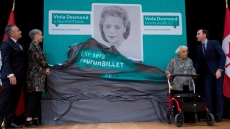OTTAWA — Five things to know about the private sponsorship program:
1. It's over 40 years old. The program was set up in 1978 but put into full effect the following year to respond to a refugee crisis out of the Vietnam War.
The Canadian government agreed to take in 12,000 of Vietnamese "boat people"; to nudge those numbers higher, it committed to matching sponsorships from private groups, largely church based.
In order to sponsor a refugee, groups had to commit to covering the cost of doing so, but also help arrange for things like accommodations, language classes and other settlement needs. By the end of the program, some 60,000 Vietnamese refugees in total would arrive in Canada.

2. It's one of the only programs of its kind in the world. It's not until recent years that other countries have adopted the private sponsorship model.
Australia launched a pilot project in 2013 and has since recommended making it permanent, while the refugee crisis created by the Syrian civil war prompted several private programs to pop up in Germany. The United Kingdom has also said it is exploring developing its own program.

3. It can be a long process and expensive process. The interest in the program has created lengthy wait times around the world. It currently takes nearly six years to sponsor a refugee from certain parts of Africa, three years from Myanmar.
The previous government ended up placing caps on the number of applications it would accept each year to be able to get through the backlog and the Liberals are continuing with the caps. This year's is 10,500. The current cost associated with sponsoring a single person is $12,600 for the year, which includes income support and start-up costs like the first months' rent and stocking the pantry.

4. The numbers are growing. Since the program began and until 2009, privately sponsored refugees made up at most 4,500 or so of the refugees who came to Canada each year. But in 2009, the previous Conservative government began shifting refugee policy to favour private sponsorship and that year welcomed over 5,000 privately sponsored refugees.
The original Conservative commitments to Syrian refugees saw private sponsors expected to take about 60 per cent of the 11,300 Syrians the Tories committed to bringing in by the end of next year. The target for this year was initially to accept 17,800 privately sponsored refugees overall, but that number will now increase with Thursday's changes.

5. There's a third way. In 2013, the government launched a new sponsorship program that sees the government share the cost of resettlement with private groups.
Known as the "blended visa office program," it's expected grow in use over the coming years as it features the benefits of private sponsorship while reducing the cost to both government and private groups. The target for this year is 2,400 blended cases, but that's expected to be exceeded, thanks to the Syrian program.
EXPANDED REFUGEE HEALTH CARE COVERAGE BEGINS BUT CONCERNS REMAIN OVER ACCESS

OTTAWA — Thousands of people who make asylum claims in Canada each year and thousands more resettled from abroad will now have their health care costs fully covered by the federal government.
Friday marks the first day of the full interim federal health care program since it was restored by the Liberals.
The program was overhauled in 2012 by the Conservative government, which eliminated blanket coverage for all refugees and asylum-seekers, resulting in a patchwork of categories that left some with barely any health coverage at all.
The controversial changes led to a series of court challenges that were consistently won by refugees claimants and their advocates.

The previous government's efforts to continue that fight in court ended when the Liberals won the election in October. Last month, the new government said it would fully restore the program.
Doctors and advocates have welcomed the move, but warn work still needs to be done — research shows many clinics are still regularly turning away refugees seeking care.


